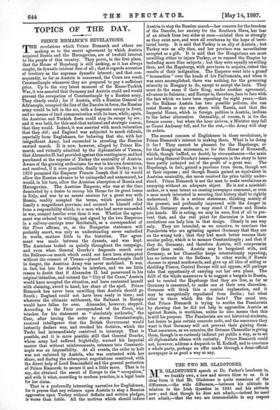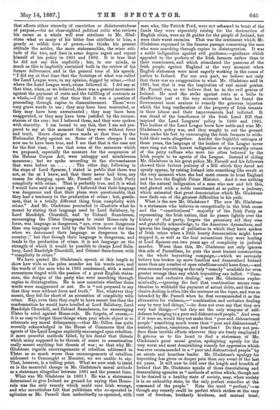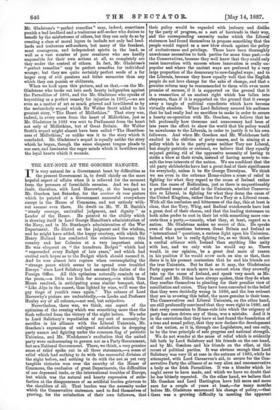THE TWO MR. GLADSTONES.
MR. GLADSTONE'S speech at Dr. Parker's luncheon is, we frankly own, a new and severe blow to us. It is clear from it that Mr. Gladstone is quite conscious of the difference,—the wide difference,—between his attitude in relation to the Irish Qaestinn in 1881 and his attitude now ; and that though he does not admit,—indeed he need not admit,—that the two are irreconcilable in any respcet
his career as a whole will ever attribute to Mr. Glad- stone what so many of his bitter foes attribute to him, a greedy or selfish love of power,—he thinks his present attitude the nobler, the more statesmanlike, the wiser atti- tude of the two, and does in some degree regret and repent himself of his policy in 1881 and 1882. It is true that he did not say this explicitly ; but, to our minds, as much as this is implicitly contained both in the review of his former deliverance, and in the general tone of his speech. " I did say at that time that the footsteps of what was called the Land League were, in my opinion, dogged by crime,—that where the Land League went, crime followed it. I did say at that time, when, as we believed, there was a general movement against the payment of rents and the fulfilling of contracts as a whole,—I did say at that time that it was a question of proceeding through rapine to dismemberment. Those', were very grave words to use ; they may have been warranted, or they may have been unwarranted ; they may have been exaggerated, or they may have been justified by the circum- stances of the case ; but I believed them, and they were spoken with sincerity. I am bound to say this, that I am not pre- pared to say at this moment that they were without force and truth. Grave charges were made at that time by the Nationalist Party against us. Some of these charges I can now see to have been true, and I see that that is the case not for the first time. I see that some of the measures which we proposed, especially the measure for the suspension of the Habeas Corpus Act, were unhappy and mischievous measures ; but we spoke according to the circumstances that were before us The other day, following in the steps of Lord Spencer, I stated in public that there was not, so far as I knew, and that there never had been, any reason for charging upon Mr. Parnell and the Irish Party complicity with crime. That is perfectly true, and it is what I would have said six years ago. I believed that their language was dangerous and that their plans were questionable, that they had a tendency to the production of crime ; but, gentle- men, that is a totally different thing from complicity with crime." And Mr. Gladstone proceeded to illustrate what he meant by stating that language used by Lord Salisbury, by Lord Randolph Churchill, and by Colonel Saunderson, encouraging the Ulster Orangemen to resist Home-role by force, was language as dangerous, "aye, even more dangerous than any language ever held by the Irish leaders at the time when we denounced their language as dangerous to the country ;" but that though their language is dangerous, and tends to the production of crime, it is not language on the strength of which it would be possible to charge Lord Salis- bury, Lord Randolph Churchill, and Colonel Saunderson with "complicity in crime."
We have quoted Mr. Gladstone's speech at this length to show how wide as the poles asunder are his words now, and the words of the man who in 1881 condemned, with a moral earnestness tinged with the passion of a great English states- man, the designs of the party who were marching through rapine to disintegration. He is now uncertain whether those words were exaggerated or not. He is "not prepared to say that they were without force and truth." Bat, whatever they meant, they fell far short of an accusation of complicity with crime. Nay, even then they ought to have meant less than the condemnation he would have levelled at Lord Salisbury, Lord Randolph Churchill, and Colonel Saunderson, for encouraging Ulster to rebel against Home-rule. He forgets, of course,— it is so easy to forget these things when your whole object is to attenuate any moral delinquency,—that Mr. Dillon has quite recently acknowledged in the House of Commons that the agents of the Land League explicitly encouraged open rebellion, if more peaceful methods failed, by his denial that threats which many supposed to be threats of resort to assassination really meant anything but threats of war; so that why Mr. Gladstone regards encouragements of rebellion addressed to Ulster as so much worse than encouragements of rebellion addressed to Connaught or Munster, we are unable to say. That, however, is a trifling point. What we now wish to insist on is the mournful change in Mr. Gladstone's moral attitude as a statesman altogether between 1881 and the present time.
What was Mr. Gladstone in 1881 I He was a statesman determined to give Ireland no ground for saying that Home- rule was the only remedy which could cure Irish wrongs, and who nevertheless felt that politicians who co-operated in agitation as Mr. Parnell then undoubtedly co-operated, with
men who, like Patrick Ford, were not ashamed to boast of the funds they were separately raising for the destruction of English cities, were no fit guides for the people of Ireland, but were their worst enemies. That was the sentiment which Mr. Gladstone expressed in the famous passage concerning the men who were marching through rapine to disintegration. It was a noble indignation against evil guidance,—guidance which appealed to the pockets of the Irish farmers rather than to their consciences, and which stimulated the passions of the Irish people against England at the very moment when English statesmen were most eagerly working in the cause of justice to Ireland. For our own part, we believe not only that there was no exaggeration in what Mr. Gladstone said in 1881, but that it was the inspiration of real moral genius. Mr. Parnell was, as we believe that he is, the evil genius of Ireland. He used the strike against rents as a bribe to disaffection just at the very moment when he found the Government most anxious to remedy the grievous injustice which the long confiscation of the property of Irish tenants in their labour and their improvements had inflicted. It was dread of the beneficence of the Irish Land Bill that inspired the Land Leaguers' policy in 1880 and 1881. The leaders of the Land League knew how noble and wise Mr. Gladstone's policy was, and they sought to cut the ground from under his feet by encouraging the Irish farmers to with- hold their rents altogether. Amidst the frightful outrages of those years, the language of the leaders of the League never once rang out with honest indignation at the cowardly crimes of the petty ruffians who were too often believed by the Irish people to be agents of the League. Instead of aiding Mr. Gladstone in his great policy, Mr. Parnell and his followers showed their furious jealousy of a Bill which they dared not openly oppose, by raising Ireland into something like revolt at the very moment when she had most reason to trust England and to love the English Prime Minister. And it was nothing but the natural indignation of a man who saw and felt this, and glowed with a noble resentment at so paltry a jealousy, which animated that great denunciation which Mr. Gladstone now finds one of the greatest difficulties in his path.
What is the new Mr. Gladstone I The new Mr. Gladstone is a statesman who believes so energetically in the Irish cause and the " constitutional " majority of the Irish Party as representing the Irish nation, that he passes lightly over the history of that party, forgets the pecuniary aid they owe and gratefully acknowledge, to the American dynamites, and ignores the language of palliation in which they have spoken of Irish crime when a little hearty denunciation might have stopped it, as well as the foul accusations they were hurling at Lord Spencer not two years ago of complicity in judicial murder. Worse than this, Mr. Gladstone not only ignores this side of Parnellism, he puts the most lenient construction on the whole boycotting campaign,—which we seriously believe has broken up more families and demoralised Ireland more than any number of open rebellions could have done,—and even excuses boycotting as the only "remedy" available for even greater wrongs than any which boycotting can inflict. "Com- bination and exclusive dealing," says Mr. Gladstone euphe- mistically,—ignoring the fact that combination means com- bination to withhold the payment of actual debts, and that ex- clusive dealing is often like the sentence on the leper, and was so intended by Mr. Parnell when he first recommended it as the alternative for violence,—" combination and exclusive dealing may be very bad things,"—he does not even say that they are very bad things,—" but they are the only weapons of self- defence belonging to a poor and disheartened people." And even
if it were so, would they not make that " poor and disheartened people " something much worse than " poor and disheartened," namely, jealous, suspicious, and heartless 4 Do they not pro- duce these terrible effects wherever they are freely employed It grieves us to the heart to find a statesman of Mr. Gladstone's great moral genius, apologising openly for the very worst and most demoralising remedy for oppression which
was ever recommended to a " poor and disheartened people" by
an astute and heartless leader. Mr. Gladstone's apology for boycotting has given us deeper pain than any event of the last
fax years. It will now be told over the length and breadth of
Ireland that Mr. Gladstone speaks of these desocialisiug and demoralising agencies as "methods of action which, though not to be desired in a healthy state of society, may, when society is in an unhealthy state, be the only perfect remedies at the command of the people." Note the word " perfeet,"—as though any remedy could be perfect which strikes at the very root of freedom, brotherly kindness, and mutual trust. Mr. Gladstone's " perfect remedies " may, indeed, sometimes punish a bad landlord and a traitorous self-seeker who desires to benefit by the misfortunes of others, but they can only do so by creating a class of moral lepers to include not only bad land. lords and traitorous self-seekers, but many of the frankest, most courageous, and independent spirits in the land, as well as a vast number of poor creatures who are hardly responsible for their own actions at all, so completely are they under the control of others. In fact, Mr. Gladstone's " perfect remedies" may be perfect remedies for individual wrongs ; but they are quite certainly perfect seeds of a far larger crop of evil passions and bitter memories than any which they can punish or obliterate. When we look upon this picture, and on that,—on the Mr. Gladstone who broke out into such hearty indignation against the Parnellites of 1881, and the Mr. Gladstone who speaks of boycotting as a perfect remedy for injustice in 1887,—we are even as a matter of art as much grieved and bewildered as by the melancholy sequel which Sir Walter Scott added to his greatest story, " The Heart of Midlothian." That story was, indeed, in every sense from the heart of Midlothian, just as Mr. Gladstone in 1881 was sent to Parliament from the heart not only of Midlothian but of Great Britain. Sir Walter Scott's sequel might almost have been called " The Heartless- ness of Midlothian," so unlike was it to the story which it concluded. Mr. Gladstone's sequel is equally unlike the story which he began, though the same eloquent tongue pleads to our ears, and fascinates the eager minds which it bewilders and the loyal hearts which it wounds.




































 Previous page
Previous page